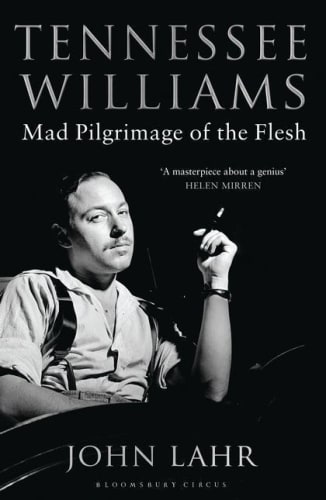Every year or so, bookshops are graced with weighty theatrical biographies that are nothing less than magnificent. In 2013, it was Daniel Rosenthal's epic The National Theatre Story; this year. John Lahr takes on Tennessee Williams.
Williams was probably one of the most complex characters ever to reach a position of such high stature. Everything about him was difficult and he was constantly argumentative and self-destructive.
Were it not for the fact that his writing was so far above almost every one of his competitors—only Eugene O'Neill and Arthur Miller were able to compete—he would not have been able to get away with behaviour that was unpalatable, unacceptable and frequently illegal.
The key here is that anyone who could write A Streetcar Named Desire and Cat on a Hot Tin Roof, not to mention numerous other wonderful plays, was able to rise above societal norms and the laws relating to homosexuality and drug taking.
John Lahr, well-known as both a theatre critic and the author of books about other troubled luminaries including Joe Orton, plunged himself into the life and works, both published and unpublished to write a definitive biography.
The result is an incomparable 766 page book (including 150 of notes, research etc.) that is almost certainly going to be the final word in Williams’s studies.
While he summarises the plays effectively, Lahr’s main strength is as a master at integrating the life and work so that every one of the constant hiccoughs which ensured Williams would be unhappy for most of his existence is shown to be a source of what many now regard as genius.
It cannot have been easy to experience life as a homosexual in the middle of the last century but Williams tended to make things harder for himself by being addicted to sex and falling for unsuitable, often violent partners.
He was irascible himself which made martyrs out of those who chose to collaborate, including his saintly agent Audrey Wood and the director with whom he formed "the most important theatrical collaboration of 20th-century American theatre": Elia Kazan.
While frequently warring with the director, even Williams reluctantly accepted that without Kazan's ability to marshal inchoate scripts into perfect plays his career might never have got off the ground and remained in the stratosphere for so long.
Kazan himself was a stormy character going through women like takeaway meals and capitulating to the House Un-American Activities Committee all too easily and unforgivably. While many of his peers including Miller were outraged, Williams didn't seem to have any qualms, working with Kazan immediately afterwards.
The writer's other close friendships were also with damaged characters including various “companions”: Maria Britneva, a self-reinvented persona who eventually became lady St Just, and the fated Diana Barrymore. What this pair had in common was a belief that Williams would marry them, despite his sexual predilections.
Once The Glass Menagerie became his first big hit, everything that Williams touched turned to gold in a glowing period that in retrospect looked almost like a Mephistophelean pact. Thereafter, drink, drugs and his own nature turned the playwright into a wreck, meaning that his later works were universal flops, despite the quality of some of the writing.
Like his poor sister Rose who lost her mind or got close to it and never recovered from the frontal lobotomy that was characterised in several of the plays, most pertinently Suddenly Last Summer, Thomas Lanier Williams suffered a similar fate, eventually ending up in a mental institution himself.
None of this should detract from the writing of a genius for whom Walter Kerr in the New York Times said, "no point in calling the man our best living playwright. He is our best playwright, and let qualifications go hang".
This big tome, twelve years in the making, does Williams full (sometimes embarrassingly so) justice and is undoubtedly going to figure on prize shortlists, quite possibly not only those limited to theatre books.
